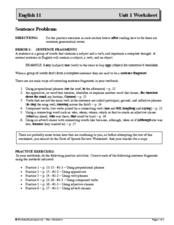Curated OER
Tone and Mood
How are mood and tone similar? Different? Help your readers understand the difference between the two with this helpful guide. On the first page, they read the definition for both tone and mood and identify words that are describe each....
Curated OER
Subjunctive in Relative Clauses
Reference guides provide information quickly and easily, so as you begin your unit on the subjunctive, distribute this guide to your learners. The first half provides examples and explanations for using the subjunctive in relative...
Curated OER
Familiar Commands
Familiar commands are probably used more frequently than formal commands, so make sure you spend an adequate time covering them. This worksheet provides great explanation, a clear chart, and a practice opportunity. It's a great way to...
Curated OER
El presente perfecto
Are you looking for a way to introduce the present perfect to your Spanish class? This reference guide is perfect! First it explains when we use the present perfect. There's a verb conjugation chart, several examples, and clear...
Curated OER
¿Qué hora es? What time is it?
This is a great reference guide for your middle and high schoolers learning how to tell time in Spanish. There are no practice opportunities provided, so consider pairing this with an exercise to get your learners using the information.
Curated OER
Adjetivos Posesivos-Possessive Adjectives Explanation
This reference guide gives a great explanation for possessive adjectives. The examples are provided both in Spanish and in English, and the information is organized in bullet points and a chart. Pair this handout with a practice activity...
Curated OER
Verbos con cambios radicales
Stem-changing, or radical changing, verbs are fairly common in Spanish. Provide your Spanish class with this reference guide to discuss the stem changes that occurs in the yo, tú, él, ella Ud., ellos, ellas, and Uds. forms.
Curated OER
Comparativos y superlativos
What are comparative and superlative adjectives? This reference guide provides a great explanation and several examples of each in both English and Spanish. Encourage your Spanish speakers to hang onto this resource!
Curated OER
Direct and Indirect Object Pronouns
After mastering direct and indirect pronouns, learn the correct sentence structure for having both in the same sentence. This resource provides explanations and clear examples. Consider printing this reference guide on a colored piece of...
Curated OER
Present Progressive Tense
Teaching the present progressive? Your class needs this informative handout! Consider reading it through with them and stopping occasionally to provide practice opportunities or board examples.
Curated OER
Sentence Problems
Writing is tough to perfect. Help your class improve their writing skills by studying different sentence problems. This reference guide covers sentence fragments, run-ons, and misplaced modifiers, but that's just to start! There's a...
Curated OER
Gustar and Similar Verbs
The -ar verbs gustar and encantar are often confusing to non-native speakers, so give your beginning classes this reference guide to help them understand the shift in sentence formation. The well-organized charts are effective and clear,...
Curated OER
Reverse Construction Verb: Gustar
What does reverse construction mean? This reference guide gives models and explanations, bringing confusion down to a minimum. It discusses some of the differences in English sentence construction and Spanish sentence construction. A...
Curated OER
Verbs with Irregular yo Forms
What are the Spanish verbs with irregular yo forms? Estoy, dar, conocer, and hacer, among others, are conjugated here to illustrate the irregular yo form. This reference guide will help clarify irregulars for your Spanish class!
Curated OER
Los Pronombres en Espanol
Give your Spanish speakers this reference guide on subject pronouns, reflexive pronouns, direct object pronouns, and indirect object pronouns. There are a few examples provided, but walk your class through this worksheet to ensure...
Curated OER
Making Nouns Plural-Worksheet 1
How do you pluralize nouns in Spanish? Is there a difference between a plural noun ending in a vowel and one ending in a consonant? Yes, there is! Give your Spanish class this reference tool, and they can learn the rules!
Curated OER
The Gender of Nouns
A great handout for middle-schoolers learning nouns and their genders, this resource is comprehensive and easy to read. Consider providing some practice opportunities for your learners while you review the information.
Other
Howcast
Howcast empowers people with engaging, useful how-to information wherever, whenever they need to know how.



















